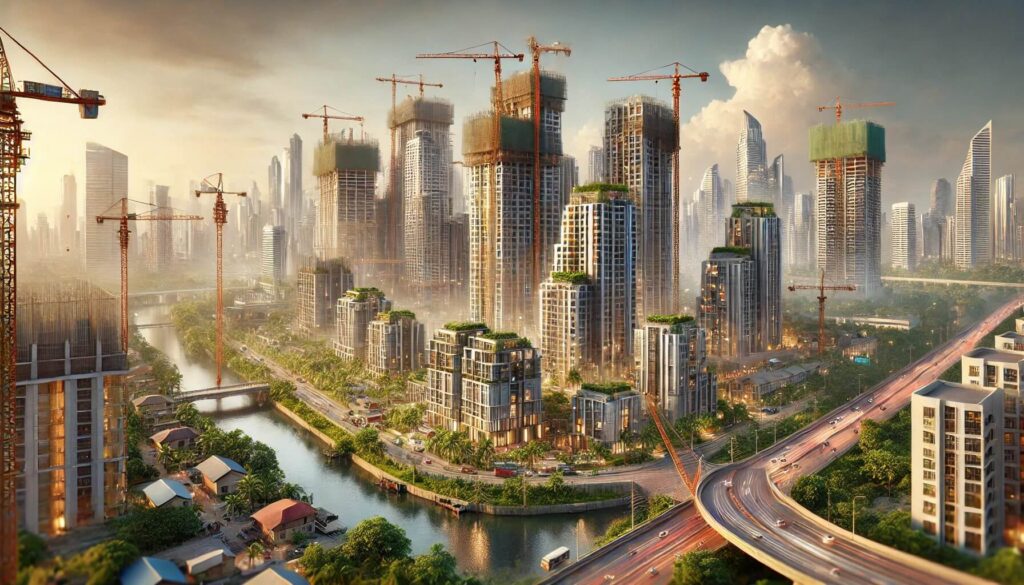As global economic landscapes evolve, Southeast Asia has emerged as a key player in the real estate market, attracting significant attention from investors, homebuyers, and industry professionals. The region’s dynamic growth, coupled with shifting global demand, is fueling a surge in real estate investments across countries like Thailand, Vietnam, Indonesia, and the Philippines. This blog post will explore the driving factors behind this trend, highlight key investment hotspots, and provide predictions for the future of Southeast Asia’s property market.

The Rise of Southeast Asia in Global Real Estate
Over the past decade, Southeast Asia has transitioned from a relatively under-the-radar region to a focal point of global real estate investment. Several factors have contributed to this rise, including economic growth, urbanization, and increasing foreign direct investment (FDI). As Western markets face saturation and economic uncertainty, Southeast Asia offers a more favorable environment for investors seeking high returns.
Economic Growth and Urbanization
Countries like Vietnam and Indonesia have experienced rapid economic growth, leading to an increase in the middle class and urbanization. This urban shift is driving demand for residential and commercial properties, making these markets particularly attractive for both local and international investors.
For more insights on the economic trends driving this growth, visit our Economic Trends in Southeast Asia page.
Increasing Foreign Direct Investment
FDI has played a crucial role in Southeast Asia’s real estate boom. Governments across the region have implemented policies to attract foreign investors, such as easing property ownership restrictions for foreigners and offering tax incentives. This has led to a surge in high-profile investments, particularly in countries like Thailand and the Philippines.
To understand more about FDI’s impact on the property market, check out our article on Foreign Investment in Southeast Asia Real Estate.
Key Investment Hotspots in Southeast Asia
As Southeast Asia continues to attract global investors, certain cities and regions are emerging as prime investment hotspots. Let’s take a closer look at some of the most promising areas:
1. Bangkok, Thailand
Bangkok remains one of the most attractive cities for real estate investment in Southeast Asia. The city’s booming tourism industry, coupled with its growing economy, makes it a hotspot for both residential and commercial properties. Recent infrastructure developments, including new metro lines and airport expansions, further enhance Bangkok’s appeal.
2. Ho Chi Minh City, Vietnam
Ho Chi Minh City has rapidly become a key player in the region’s real estate market. The city’s young population, growing middle class, and strong economic growth are driving demand for housing and commercial spaces. Additionally, the Vietnamese government’s pro-investment policies make it easier for foreigners to invest in the local property market.
3. Jakarta, Indonesia
Jakarta is another city to watch. Indonesia’s capital is undergoing significant infrastructure improvements, including the construction of new highways and public transportation systems. These developments are expected to drive up property values, making Jakarta an attractive option for investors.
For a deeper dive into these hotspots, visit our Southeast Asia Real Estate Hotspots section.
Trends Driving the Surge in Southeast Asian Real Estate
Several key trends are fueling the surge in real estate investments across Southeast Asia. Understanding these trends can help investors and industry professionals make informed decisions.
1. Shift in Global Demand
As traditional markets like the United States and Europe face economic challenges, global investors are increasingly looking towards Southeast Asia for opportunities. The region’s relatively stable economies, coupled with high growth potential, offer attractive alternatives to more mature markets.
2. Technological Advancements
The adoption of technology in the real estate sector is transforming how properties are bought, sold, and managed in Southeast Asia. From proptech startups to smart cities initiatives, technology is enhancing the efficiency and transparency of the market, making it easier for investors to enter and navigate.
3. Sustainability and Green Buildings
Sustainability is becoming a key consideration in Southeast Asia’s real estate market. With growing awareness of environmental issues, there is increasing demand for green buildings and sustainable developments. This trend is particularly strong in cities like Singapore, where government policies promote eco-friendly construction practices.
For more on how technology and sustainability are shaping the market, explore our Tech and Sustainability in Southeast Asia Real Estate article.
Predictions for the Future
Looking ahead, the future of Southeast Asia’s real estate market appears bright. Here are some predictions for what we can expect:
1. Continued Growth in Secondary Cities
While major cities like Bangkok and Ho Chi Minh City will continue to attract investment, secondary cities such as Da Nang (Vietnam) and Chiang Mai (Thailand) are expected to grow in popularity. These cities offer lower entry costs and high growth potential, making them attractive alternatives for investors.
2. Rise of Mixed-Use Developments
Mixed-use developments, which combine residential, commercial, and recreational spaces, are expected to become more common in Southeast Asia. These developments cater to the region’s urbanizing population and offer a more integrated lifestyle, which is increasingly in demand.
3. Increased Interest in Industrial and Logistics Properties
As e-commerce continues to grow in Southeast Asia, there will be increased demand for industrial and logistics properties. Investors are likely to see opportunities in warehouse spaces, distribution centers, and other logistics-related real estate.
Conclusion
Southeast Asia’s real estate market is experiencing a surge in investment, driven by economic growth, urbanization, and global demand shifts. As the region continues to evolve, investors and industry professionals must stay informed about the latest trends and developments to capitalize on the opportunities available. Whether you’re considering investing in Bangkok, Ho Chi Minh City, or Jakarta, Southeast Asia offers a dynamic and promising market for real estate.
For the latest updates and in-depth analysis, be sure to follow Property News Asia and stay ahead of the curve in this rapidly changing market.
